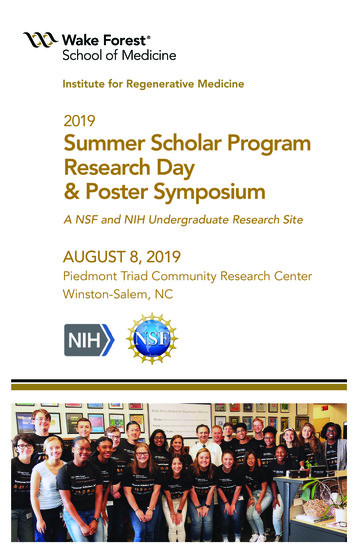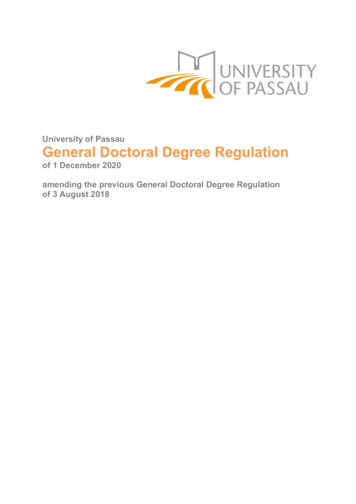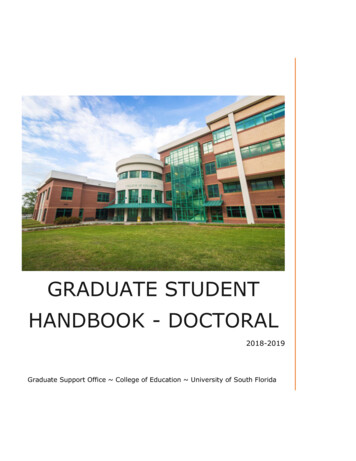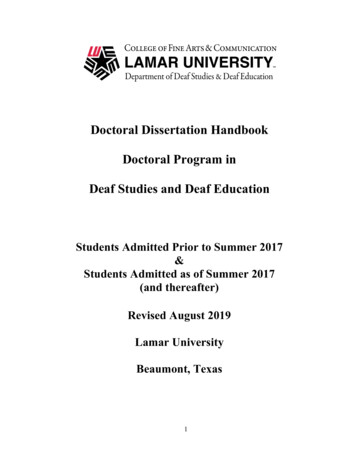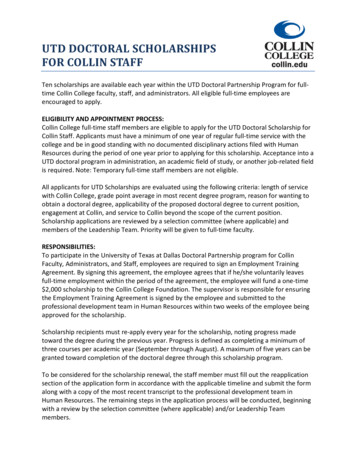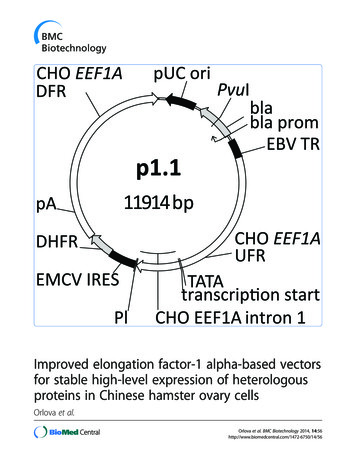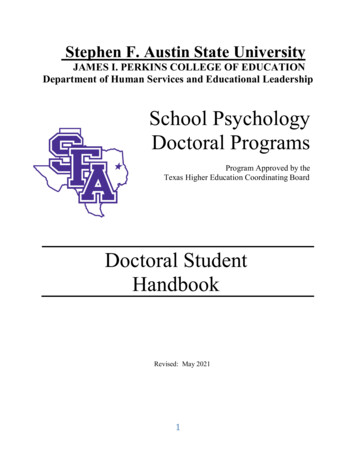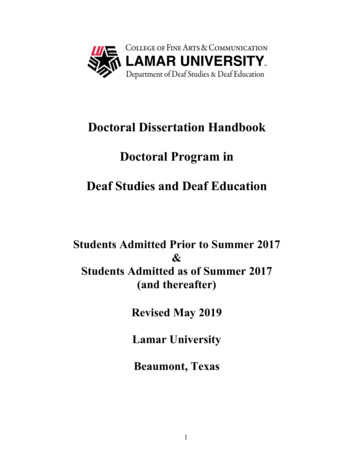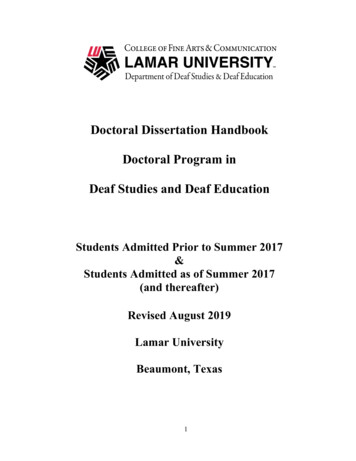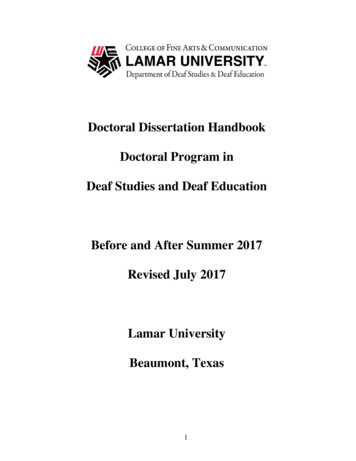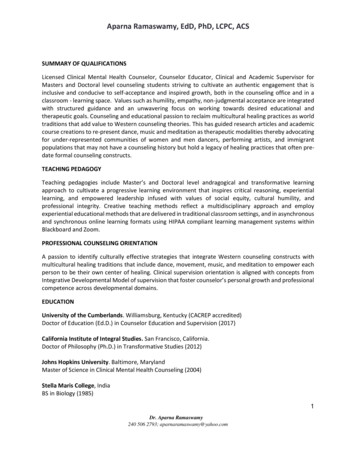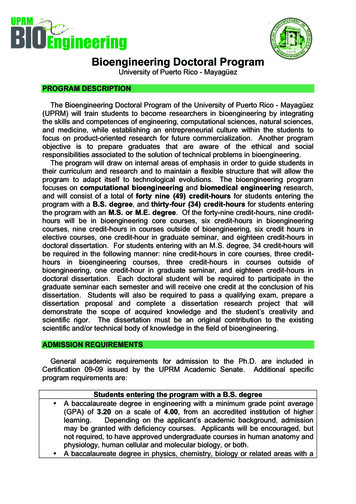
Transcription
Bioengineering Doctoral ProgramUniversity of Puerto Rico - MayagüezPROGRAM DESCRIPTIONThe Bioengineering Doctoral Program of the University of Puerto Rico - Mayagüez(UPRM) will train students to become researchers in bioengineering by integratingthe skills and competences of engineering, computational sciences, natural sciences,and medicine, while establishing an entrepreneurial culture within the students tofocus on product-oriented research for future commercialization. Another programobjective is to prepare graduates that are aware of the ethical and socialresponsibilities associated to the solution of technical problems in bioengineering.The program will draw on internal areas of emphasis in order to guide students intheir curriculum and research and to maintain a flexible structure that will allow theprogram to adapt itself to technological evolutions. The bioengineering programfocuses on computational bioengineering and biomedical engineering research,and will consist of a total of forty nine (49) credit-hours for students entering theprogram with a B.S. degree, and thirty-four (34) credit-hours for students enteringthe program with an M.S. or M.E. degree. Of the forty-nine credit-hours, nine credithours will be in bioengineering core courses, six credit-hours in bioengineeringcourses, nine credit-hours in courses outside of bioengineering, six credit hours inelective courses, one credit-hour in graduate seminar, and eighteen credit-hours indoctoral dissertation. For students entering with an M.S. degree, 34 credit-hours willbe required in the following manner: nine credit-hours in core courses, three credithours in bioengineering courses, three credit-hours in courses outside ofbioengineering, one credit-hour in graduate seminar, and eighteen credit-hours indoctoral dissertation. Each doctoral student will be required to participate in thegraduate seminar each semester and will receive one credit at the conclusion of hisdissertation. Students will also be required to pass a qualifying exam, prepare adissertation proposal and complete a dissertation research project that willdemonstrate the scope of acquired knowledge and the student’s creativity andscientific rigor. The dissertation must be an original contribution to the existingscientific and/or technical body of knowledge in the field of bioengineering.ADMISSION REQUIREMENTSGeneral academic requirements for admission to the Ph.D. are included inCertification 09-09 issued by the UPRM Academic Senate. Additional specificprogram requirements are: Students entering the program with a B.S. degreeA baccalaureate degree in engineering with a minimum grade point average(GPA) of 3.20 on a scale of 4.00, from an accredited institution of higherlearning.Depending on the applicant’s academic background, admissionmay be granted with deficiency courses. Applicants will be encouraged, butnot required, to have approved undergraduate courses in human anatomy andphysiology, human cellular and molecular biology, or both.A baccalaureate degree in physics, chemistry, biology or related areas with a
minimum grade point average (GPA) of 3.20 on a scale of 4.00, from anaccredited institution of higher learning, and with a mathematical backgroundat the level of differential equations. Depending on the applicant’s academicbackground, admission may be granted with deficiency courses. Applicantswill be encouraged, but not required, to have approved undergraduate coursesin human anatomy and physiology, human cellular and molecular biology, orboth.International students for whom English or Spanish are not their first languageare required submit a Test of English as a Second Language (TOEFL) examscore.Student entering the program with an M.S. or M.E. degree:A master's degree in engineering from an accredited institution of higherlearning. Depending on the applicant’s academic background, admission maybe granted with deficiency courses. Applicants will be encouraged, but notrequired, to have approved undergraduate or graduate courses in humananatomy and physiology, human cellular and molecular biology, or both.A master's degree in physics, chemistry, biology or related areas from anaccredited institution of higher learning, and with a mathematical backgroundat the level of differential equations. Depending on the applicant’s academicbackground, admission may be granted with deficiency courses. Applicantswill be encouraged, but not required, to have approved undergraduate orgraduate courses in human anatomy and physiology, human cellular andmolecular biology, or both.International students for whom English or Spanish are not their first languageare required submit a Test of English as a Second Language (TOEFL) examscore.The same norms established by the UPRM's Academic Senate as well as allpreviously described admission guidelines to the doctoral program are applicable totransfer students. The program’s graduate committee will consider transfers from thedoctoral program into the master’s program, with previous recommendation from thestudent’s thesis committee and from the program’s executive director.GRADUATION REQUIREMENTSThe general academic requirements for conferring the doctoral degree are statedin Certification 09-09 of the UPRM's Academic Senate. Specific requirements for theDoctoral Program in Bioengineering are described below.Students entering the program with a B.S. degree are required to approve aminimum of forty-nine (49) credit-hours distributed in the following manner: 9 credit-hours in core courseso Principles of Biomedical Engineering (INME6065)o Principles of Computational Bioengineering (BING 6004)o Molecular and Cellular Biology for Engineers (BING 6002) 6 credit-hours in bioengineering courses 9 credit-hours in courses outside of bioengineering 6 credit-hours in elective courses (either in bioengineering or outside) 1 credit-hour in seminar (BING 8998)o The topics covered in the seminar will include:
§ Scientific issues§ Social and ethical issues§ Entrepreneurship18 credit-hours in doctoral dissertation (BING 8999)Students entering the program with an M.S. or M.E. degree are required to approvea minimum of thirty-four (34) credit-hours distributed in the following manner: 9 credit-hours in core courseso Principles of Biomedical Engineering (INME6065)o Principles of Computational Bioengineering (BING 6004)o Molecular and Cellular Biology for Engineers (BING 6002) 3 credit-hours in bioengineering courses 3 credit-hours in courses outside of bioengineering 1 credit-hour in seminar (BING 8998)o The topics covered in the seminar will include:§ Scientific issues§ Social and ethical issues§ Entrepreneurship 18 credit-hours in doctoral dissertation (BING 8999)Students will prepare a plan of study before the second month of their secondsemester of studies, and under the guidance of the student’s graduate committee.The plan of study will be prepared taking into consideration: the student’s academicand research interests, suitability of courses to prepare students for their researchwork, and academic offer. No more than 9 credit-hours of advanced undergraduatelevel courses can be used to complete doctoral degree requirements.Minimum Academic Index RequirementsIn order to complete the doctoral degree, each student must approve a minimumof 49 credit-hours with a GPA of 3.0 or higher. Students enrolled in the doctoralprogram may repeat a course with an earned grade of C or lower only once.Courses with a final grade of A or B cannot be repeated.Maximum Number of Transfer Credits to be AllowedCourses taken at UPRM in fulfillment of requirements of another graduate programmay be utilized to fulfill the requirements of the proposed program. Courses taken atother institutions of higher learning may be utilized to fulfill doctoral programrequirements, but are subject to residency requirements as specified in Certification09-09 which establishes that that 60% of the courses in a student’s plan of studymust have been taken at UPRM. The program’s graduate committee will determinewhich courses could be transferred. All transfer courses must be approved with aminimum grade of B. Under no conditions may thesis credits be transferred.ResidencyThe “Norms that Regulate Graduate Studies at UPRM” stipulate the residencyrequirements as follows:
“Residency requirements at the Doctoral level: a minimum of four semesters forstudents entering with a Bachelors degree, and a minimum of two semesters forstudents entering with a Master's degree. In both cases the student will completesixty (60) percent of the course work for the program at UPRM.”Graduate SeminarDoctoral students will be required to register for the Graduate Seminar inBioengineering course for the duration of their doctoral studies and will be awardedone credit-hour the semester the dissertation is turned in. Besides scientific andtechnical topics, the graduate seminar will also cover topics related toentrepreneurship, intellectual property, and social and ethical issues related to thefield of bioengineering.Qualifying ExamAll doctoral students will be required to take a doctoral qualifying examination inorder to evaluate the candidate’s competency in bioengineering core areas. Theexamination consists of three written parts, which will be prepared, supervised andevaluated by the program’s Graduate Studies Committee in coordination with itsfaculty.A student who has passed the examination will be allowed to register in BING8999 – Doctoral Dissertation. This student is henceforth regarded as a doctoraldegree candidate in the Bioengineering Program at UPRM.A student who has failed the qualifying examination the first time may retake it asecond and final time within one semester of the first attempt. According to UPRMregulations, a second failure will result in the student’s dismissal from the graduateprogram. If the student does not hold a Master’s degree in Bioengineering, thestudent will be given the opportunity to transfer to the Bioengineering’s Master ofScience or Master of Engineering programs. If none of these options is selected, thestudent will be suspended from the Bioengineering graduate program. After one yearof suspension, the student may apply for a second and final admission to the sameprogram or to another UPRM graduate program.Dissertation ProposalAfter successfully passing the qualifying examination, the doctoral student isrequired to submit a research proposal regarding his/her project of interest.Following the acceptance of the research proposal, the student is given acomprehensive examination to determine initiative, originality, breadth, and high levelof professional commitment to the problem selected for investigation. Thisdissertation proposal exam consists of a written part (the proposal) and an oraldefense of the proposal.DissertationAll Ph.D. candidates must undertake an independent research project thatbecomes a significant contribution to the advancement of knowledge in a particulararea of bioengineering. All doctoral candidates must pass the oral exam in defenseof his/her dissertation. Students must have passed the qualifying examination in
order to register for the doctoral dissertation course, and have passed the preliminaryexam before defending his/her thesis.Publication in Peer-Reviewed JournalsAll students should have at least one (1) scientific article related to the dissertationsubmitted in a peer-reviewed journal before the thesis defense.COURSE DESCRIPTIONSThe following courses will comprise the academic offerings of the doctoral programin Bioengineering:INEL 5208 PRINCIPLES OF BIOMEDICAL INSTRUMENTATION. 4 credithours. Three hours of lecture and two hours of laboratory practice per week.Prerequisite: INEL 4201 or consent of the department head. Theoretical andpractical aspects of the methods used to measure physiological events withemphasis in the cardiovascular, pulmonary and nervous systems.INEL 6097 BIOMEDICAL ACOUSTICS. 3 credit-hours. Three hours of lectureper week. Prerequisite: Graduate standing or consent of the instructor.Application of acoustics principles toward the design of diagnostic andtherapeutic medical devices. Use of computer tools to simulate the acousticresponse of systems composed of biological tissues.INQU 8027 CHEMICAL ENGINEERING PRINCIPLES APPLIED TO DRUGTHERAPY. 3 credit-hours. Three hours of lecture and two hours of laboratorypractice per week. Prerequisite: This is an elective course intended for graduatestudents in chemical engineering or related fields. The course focuses on theapplication of chemical engineering principles applied to drug therapy includingknowledge of pharmacokinetic and pharmacodynamic concepts, design oftherapeutic regimens, and emphasis on the application of transport phenomenafor the design and modeling of drug delivery devices. Upon completion of thiscourse students are expected to understand the basic principles, models andtheories of drug delivery, analyze physiological characteristics of biologicalsystems and evaluate their implication in biological transport, design andcalculate dosage regimes, create transport models for biological molecules,estimate diffusion coefficients, and design drug delivery systems fromexperimental data.INQU 8007 TRANSPORT PHENOMENA IN BIOLOGICAL SYSTEMS. 3 credithours. Three hours of lecture per week. Prerequisite: INQU6016 or consent ofthe instructor. This is an elective course intended for graduate students inchemical engineering or related fields. The course discusses the integration ofthe fundamentals of transport phenomena to biological systems. It focuses onthe application of momentum and mass transport from the cellular to the organlevel, including artificial organs. Upon the completion of the course the studentsare expected to understand the fundamental principles of biological transportprocesses by formulating the mathematical expressions of these principles and
their solution; analyze physiological characteristics of biological systems, andevaluate their implication in biological transport.INME 6065 PRINCIPLES OF BIOMEDICAL ENGINEERING. 3 credit-hours.Three hours of lecture per week. Prerequisite: Authorization of the Director.Application of engineering principles and quantitative methods in biology toanalyze and describe complex biological systems. Survey of human anatomyand physiology, modern molecular biology, professional ethics, and regulatoryissues.INME 6115 BIOMATERIALS. 3 credit-hours. Three hours of lecture per week.Prerequisite: Authorization of the Director. Study of advanced materials asapplied to biomedical systems. Integration of materials science and engineeringconcepts with biology for the successful design of interfaces between living cellsand organic and inorganic materials.INME 6135 TISSUE ENGINEERING. 3 credit-hours. Three hours of lecture perweek. Prerequisite: Permission of department head. Study of tissue engineeringapplied to biomedical systems with emphasis on quantitative cell and tissuebiology, cell and tissue characterization, engineering methods and design, andclinical applications.BING 6004 PRINCIPLES OF COMPUTATIONAL BIOENGINEERING. 3 credithours. Three hours of lecture per week. Prerequisite: Graduate standing orpermission of department head. Study of computational issues and methodsemployed in molecular biology. Biological data sources available on the internetwill be introduced and analyzed.BING 8202 STRUCTURAL BIOINFORMATICS. 3 credit-hours. Three hours oflecture per week. Prerequisite: BING 6004. Analysis and prediction of theconformation of biological macromolecules. Study of the relation betweenmacromolecular structure and function, with emphasis on proteins.BING 6002 MOLECULAR AND CELLULAR BIOLOGY FOR ENGINEERS. 3credit-hours. Three hours of lecture per week. Prerequisite: Graduate standingor consent of the instructor. Study of the biology of cells, emphasizing examplesrelevant to bioengineering. Topics such as protein structure and function, cellularmembranes and organelles, cell growth and oncogenic transformation, cellulartransport, receptors and cell signaling, the cytoskeleton, the extracellular matrix,and cell movement will be included.BING 6016 ERGONOMICS FOR BIOMEDICAL SCIENTISTS ANDENGINEERS. 3 credit-hours. Three hours of lecture per week. Prerequisite:Permission of department head. Study of anatomical and physiological conceptsthat describe and predict human motor capabilities, with particular emphasis onthe evaluation and design of manual activities in diverse occupations. Use ofquantitative and simulation models to explain muscle strength performance,cumulative and acute musculoskeletal injuries, physical fatigue, and humanmotion control.
BING 6017 ADVANCED BIOSTATISTICS APPLICATIONS. 3 credit-hours.Three hours of lecture per week. Application of statistical methods to solvebiomedical and bioengineering problems. Use of generalized linear models,including logistic, Poisson, and binomial regressions. Design of experimentsunder biological process constraints and appropriate data analysis. Use ofartificial neural network techniques to model nonlinear relationships amongqualitative and quantitative variables of a biomedical system.BING 6998 ENGINEERING PROJECT. 0-6 credit-hours. Variable contactperiod. Prerequisite: Permission of program’s director. Comprehensive study ofa specific bioengineering problem selected to integrate the knowledge acquiredin the graduate program of study.BING 6999 MASTER’S THESIS. 0-6 credit-hours. Variable contact period.Prerequisite: Permission of program’s director. Research in the field ofBioengineering and presentation of a thesis.BING 8995 ADVANCED TOPICS IN BIOENGINEERING. 1-6 credit-hours.Variable contact period. Prerequisite: Permission of program’s director. Study ofadvanced topics in bioengineering.BING 8997 INDEPENDENT STUDIES. 1-3 credit-hours. Variable contactperiod. Prerequisite: Permission of program’s director. Independent studies inbioengineering.BING 8998 GRADUATE SEMINAR. 0-1 credit-hours. One hour of seminar perweek. Prerequisite: Permission of program’s director. Oral presentations anddiscussions in areas of interests in bioengineering.BING 8999 DOCTORAL DISSERTATION. 0-9 credit-hours. Variable contactperiod. Prerequisite: Permission of program’s director. Development, preparationand defense of a dissertation based on an original research work inbioengineeringFACULTYThe UPRM Bioengineering Graduate Program has a very activeinterdisciplinary group of faculty members. Faculty members come fromvarious academic departments within the Colleges of Engineering and Arts andSciences.NameJorge AlmodóvarNoel ArtilesMauricio CabreraSilvina CancelosMiguel CastroUbaldo CórdovaDepartmentChemical Eng.Industrial Eng.Industrial Eng.Mechanical Eng.ChemistryChemical Eng.Rubén DíazMechanical Eng.Research AreasBiomaterialsStatistics, Experimental DesignBioinformatics, probability and statisticsBiomedical acoustics, bubble dynamicsNanoscaled sensorsTransport Phenomena, AppliedMathematicsTransport Phenomena in BiologicalSystems,
MaribellaDomenechDavid GonzálezSamuelHernándezEduardo JuanMagda LatorreJuanLópezGarrigaVidya ManianMicro/Nano Fabrication TechnologiesTumor cell signaling, microfluidic systemsfor 3D cell cultureExperimental DesignSpectroscopyChemical Eng.Industrial Eng.ChemistryElectrical andEng.Chemical Eng.ChemistryComputerBiomedical Acoustics, BioinstrumentationLourdes MedinaIndustrial Eng.Juan C. MartínezCruzadoEnriqueMeléndezTaras OleksykPatricia OrtizBiologyNanoparticle-cell interactionsStructure and function relationships inhemeproteinsBrain computer interfaces, brain imaging,image processing, biosensory data cular biologyChemistryMetal-based drugs and biosensorsBiologyChemical Eng.Bioinformatics, geneticsBiotechnology, microbiologyNazario RamírezIndustrial Eng.Pedro RestoKaren RíosManuelRodríguezJaime SeguelMechanical Eng.MathematicsElectrical and ComputerEng.Electrical and ComputerEng.Mechanical Eng.ComputerInformationSciences and EngineeringMechanical Eng.Chemical Eng.Experimental Design, Prediction of DrugStabilityMicrofluidic devicesMathematical BiologyDatabase Management SystemsDavid SerranoHeidy SierraPaul SundaramMadeline TorresBienvenido VélezElectrical Eng.ComputerInformationSciences and EngineeringParallel and Distributed Computing,BioinformaticsRehabilitative Medical DevicesBiophotonicsBiomaterialsPolymers, Biomaterials, Hydrogel-BasedDrug DeliveryBioinformaticsCONTACT INFORMATIONRicky Valentin, PhD ExecutiveDirectorUPRM Bioengineering GraduateProgramphone: 787-832-4040 x-6321email:investigacion.ingenieria@upr.eduOffice of the DeanCollege of Engineeringphone: 787-832-4040 x-3822email: decano.ingenieria@upr.edubioengineering@uprm.edu
level courses can be used to complete doctoral degree requirements. Minimum Academic Index Requirements In order to complete the doctoral degree, each student must approve a minimum of 49 credit-hours with a GPA of 3.0 or higher. Students enrolled in the doctoral program may repeat a course with an earned grade of C or lower only once.
